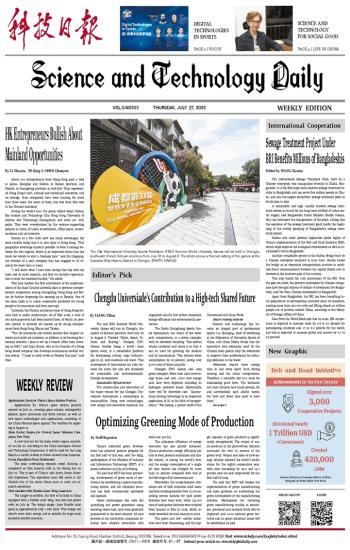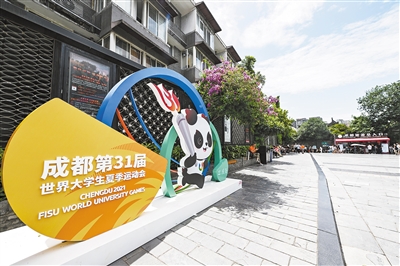
 Digital Technologies in Sports
Digital Technologies in Sports Chengdu Universiade's Contribution to a High-tech Shared Future
Chengdu Universiade's Contribution to a High-tech Shared Future HK Entrepreneurs Bullish About Mainland Opportunities
HK Entrepreneurs Bullish About Mainland Opportunities Sewage Treatment Project Under BRI Benefits Millions of Bangladeshis
Sewage Treatment Project Under BRI Benefits Millions of Bangladeshis New Graphic
New Graphic WEEKLY REVIEW
WEEKLY REVIEW Optimizing Greening Mode of Production
Optimizing Greening Mode of Production 无标题
无标题 无标题
无标题 Science and Technology For Social Good
Science and Technology For Social Good
 |
| The 31st International University Sports Federation (FISU) Summer World University Games will be held in Chengdu, southwest China's Sichuan province, from July 28 to August 8. The photo shows a themed setting of the games at the Kuanzhai Alley Historic District in Chengdu. (PHOTO: XINHUA) |
The 31st FISU Summer World University Games will run in Chengdu, the capital of Sichuan province, from July 28 to August 8. Themed "Green, Smart, Vibrant and Sharing," Chengdu FISU Games, besides being a world -class sports event, is a remarkable platform for showcasing cutting -edge technologies in AI, new materials and more. This convergence of innovations not only elevates the event but also sets standards for sustainable and environmentally-friendly development.
Sustainable Infrastructure
The construction and renovation of the major venues for the Chengdu Universiade demonstrate a commitment to sustainability. Using new technologies, new energy and innovative materials, the organizers aim for low carbon emissions, energy efficiency and environmental protection.
The Xindu Xiangcheng Sports Center Gymnasium, the venue of the water polo competitions, is a prime example, with its rainwater recycling. This system retains rainwater and treats it so that it can be used for greening the stadium and its maintenance. This reduces water consumption by 20 percent, saving over 3,000 tons of water annually.
Chengdu FISU Games also uses green transport. More than 1,300 new energy buses and over 1,000 new energy cars, have been deployed, including 80 hydrogen -powered buses. Additionally, there will be driverless cars. "Autonomous driving technology is an important application of AI in the field of transportation," Wei Jiaxing, a project staff of the Universiade told China News.
Smart training systems
Science and technology has become an integral part of professional sports. Liu Zhenqing, chief of swimming at the Federation of University Sports of China, told China Media Group that the innovative tech swimsuits used by the Chinese team greatly help the swimmers to improve their performance by reducing resistance to the water.
Swimmers require more energy than in any other sport, both during training and the actual competitions. Therefore, a scientific diet is a must for maintaining good form. The dieticians not only calculate how much protein, fat and carbohydrate each athlete needs, but how and when they need to have them.
Coach Zhang Yuhan said the swimmers have an extra meal at 8:30 p.m. every day to replenish glycogen in the body, a form of glucose that is a major source of energy.
To ensure accurate competition results, advanced systems have been introduced.
For instance, the Sichuan Water Sports School, where the rowing events take place, uses an automatic start system to ensure the athletes' reaction time to the start signal is less than 0.09 seconds, thereby ensuring that all boats start practically simultaneously. The electronic timing and scoring system enhances accuracy to one-thousandth of a second, creating a precise competitive environment.
Leaving a Lasting Legacy
Beyond the immediate event, Chengdu FISU Games aims to leave a lasting legacy. Post-event, its venues will host other major events such as the World Sports Dance Festival and the International Tennis Federation World Tour, said Sheng Gang, Deputy Director of the Chengdu Sports Bureau.
Additionally, the venues will be open to influential professional club events like football, basketball, volleyball, table tennis and badminton matches as well as e-sports. This proactive approach seeks to enhance the venues' competitiveness while catering to market demands.
By showcasing new and more precise technologies, many of which are yet to be widely applied in people's lives, Chengdu FISU Games is a significant contributor to the nation's sustainable development. It is also creating lasting benefits for its residents and fostering a sense of pride and accomplishment as it embraces cutting-edge solutions for a shared future.

 Next
Next



